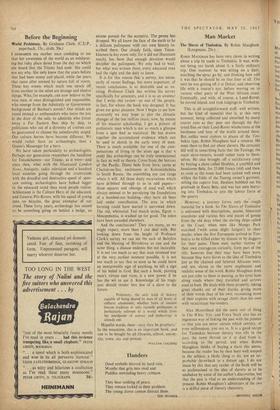Before the Beginning
I REMEMBER my mother once confiding to me that her awareness of the world as an exhilarat- ing but risky place dated from the day on which she heard that the Titanic had sunk. She could not say why. She only knew that the years before that had been sunny and placid, while the years. that came after seemed by nature full of storm. These key events which mark one epoch off from another in the mind are strange and elusive things. Who,-for example, can now believe in the wise men, at once distinguished and responsible. who emerge from the Admiralty or Government background of Buchan's novels? Our minds are tuned instead to ambassadors who leave the key in the door of the safe, to admirals who fritter away a Far Eastern fleet ship by ship, to politicians who out of a diversity of courses can be guaranteed to choose the unbelievably stupid. Our culture heroes have become different. We would rather have an archaeologist than a Queen's Messenger for a hero.
We have taken particularly to archeologists. Perhaps our generation remembers the headlines for Tutankhamen---our Titanic, as it were--and since then, what with the Illustrated London News, Antiquity, radio, television and a hundred local societies going through the countryside with the dreadful and destructive speed of open- cast mining. archeologists have bulked bigger in the educated mind than most people realise. Schliemann is the Culture Hero of the educated, and General Pitt-Rivers, with his squad of young men on bicycles, the great exemplar of our creed. These forty years, archeology has ceased to be something going on behind a hedge, an
arcane pursuit for the eccentric. The penny has dropped. We all know the face of the earth to Ls: a delicate palimpsest with our own history in- scribed there. Our cloudy faith, since Tutan- khamen (a key event only, for it did not illuminate much), has been that enough devotion would decipher the palimpsest. We only had to wait; but what was written there, every educated man had the right and the duty to know.
It is for this reason that a survey, not neces- sarily of recent findings, but more important, of recent conclusions, is so desirable and so ex- citing. Professor Clark has written his survey specifically for amateurs. and it is as an amateur that I write this review--as one of the people, in fact, for whom the book was designed. It has given me great pleasure. Now I begin to see how accurately we may hope to plot the climatic changes of the last million years; now, by means of his massive scholarship, I get a picture of prehistoric man which is not so much a glimpse from a spot find as statistical. He has drawn together the accumulated evidence which can be used to sketch in the early story of man. There is much available; for one of the com- pensations of living in the atom age is that a study like archeology can be truly international in fact as well as theory. Cores from the bottom of the Pacific, Djetis beds from Java, caves at Clacton-on-Sea, enclosures at Kolomiishchina in South Russia; the assembling eye can range where it will. All those dusty excavations which have dribbled through to us in odd papers-- those squares and oblongs of mud wall which always seemed to be parodying the foundations of a bombed-out building-- they have all been laid under contribution. The area in which farming could have started is narrowed dOwn. The old, whimsical Test match series, Egypt v. Mesopotamia, is washed up for good. The ashes have been awarded elsewhere.
And the conclusions? They are many, as we might expect, more than I can deal with. But looking down from the height of Professor Clark's survey we can see the sack of Babylon and the blasting of Hiroshima as one and the same thing, a disease endemic but not incurable. It is not too much to say that man invented war at the very earliest moment possible. It is not too much to say that as soon as he could leave an interpretable sign of anything, he left a sign of his belief in God. But such a book, plotting man's virtues and vices, is a new power if he has the wit to use it. Knowledge of his tragic past should render him less of a slave to the future.
. . . Prehistory, the only kind of history capable of being shared by men of all levels of cultural attainment, whether heirs of ancient literate tradition or only recently preliterate, is Particularly relevant to a world which from the standpoint of science and technology is already one.
Hopeful words, these--may they be prophetic! In the meantime, this is an important book. and one to be bought by all libraries, school, univer- sity, town, city and private.
WILLIAM GOLDING














































 Previous page
Previous page